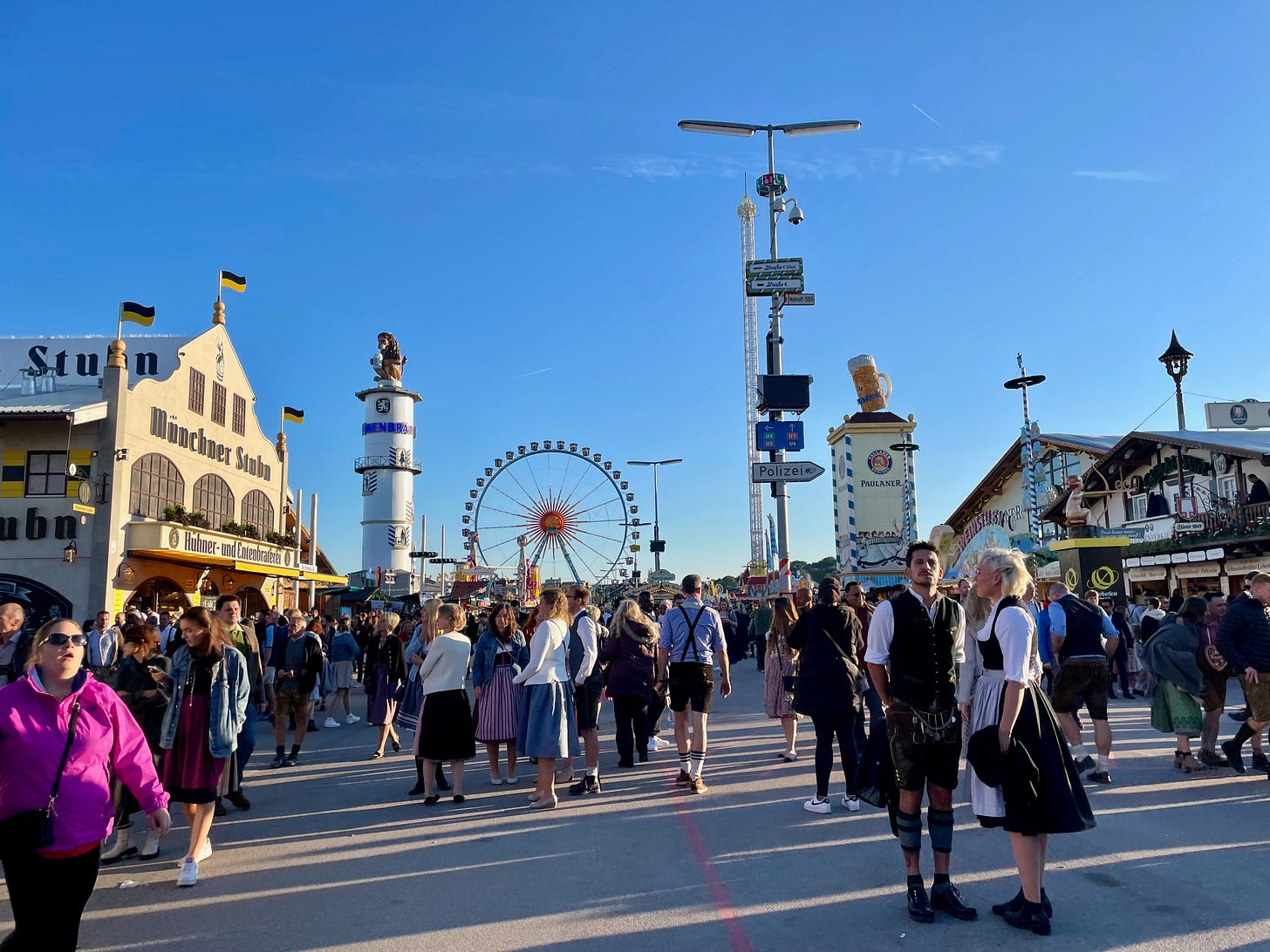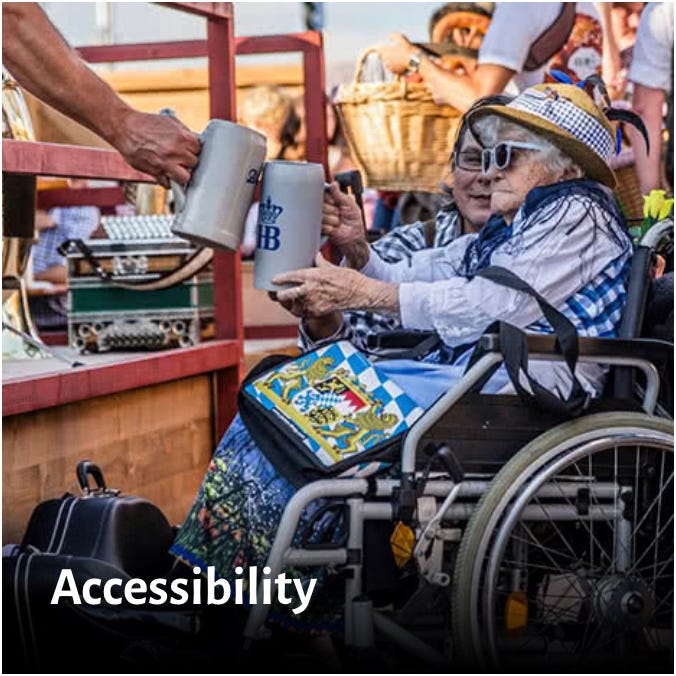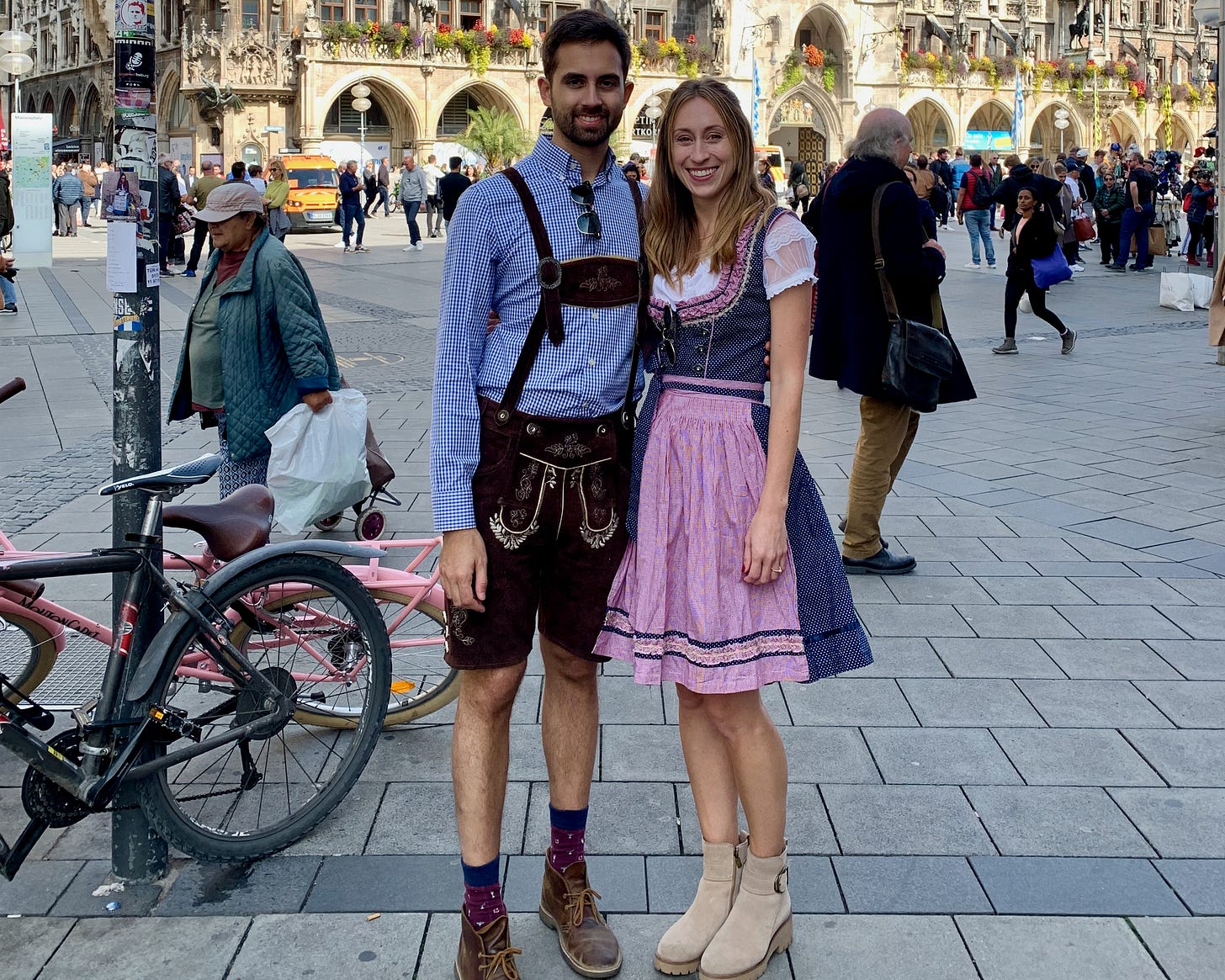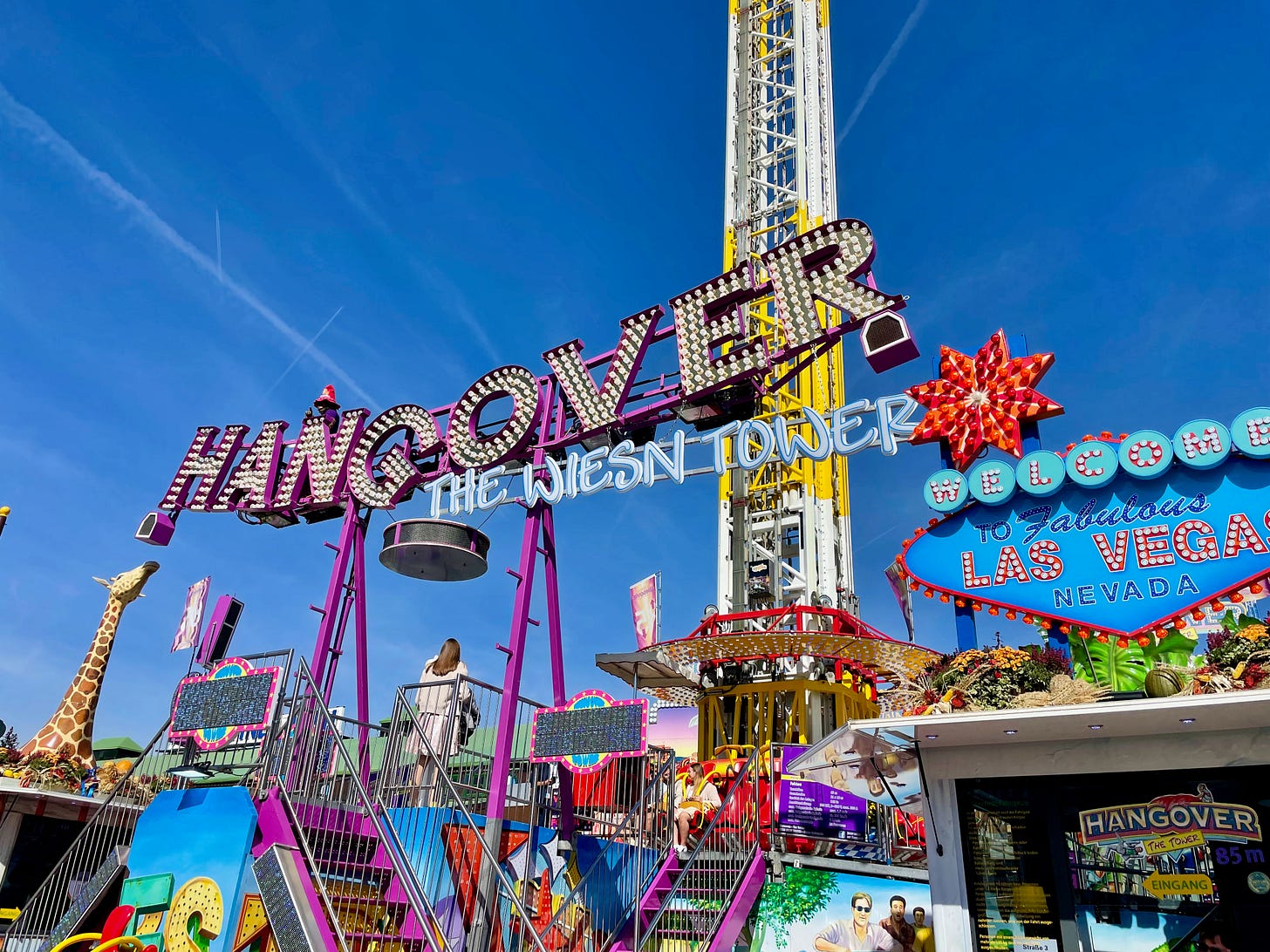Seven Rules of Oktoberfest, A Very Orderly Drinking Binge
the rules are there to ensure fun is being had
Thank you all for your kind words following last week’s essay. I cherish each of your comments, texts, and emails. I don’t have the most subscribers on Substack, but I have the best ones! And if you are one of the handful that subscribed in the last week or two, welcome!! I’m so happy you’re here. I’d love it if you said hello in the comments.
At the risk of giving you emotional whiplash, today’s topic is much more lighthearted: my trip to Oktoberfest. I went a couple weeks ago with a small group of friends after finding cheap flights and buying them on a whim.
For the uninitiated, Oktoberfest is a 200-year-old annual beer festival held in Munich, Germany from late September to early October. It gets 6 million visitors each year. My husband, adorable home brewing nerd that he is, had always wanted to go to Oktoberfest, but I had never had the itch. I imagined it would be a weeks-long bender full of corporate-sponsored garbage and blackout drunk tourists running around in chintzy, risqué Halloween costumes, which didn’t sound very fun to me.
I was dead wrong. The only brand names on display were those of local Munich breweries, and nearly everyone wore tasteful, traditional Bavarian garb. We were part of a small handful of foreigners massively outnumbered by German families. Oktoberfest is a very traditional folk festival, and it’s for everyone aged 9 months to 99 years, per this photo from the official app:
We saw no fights, almost no vomit, hardly any indecent clothing. I was shocked by the general lack of sloppiness! Even better, beer and food were strangely affordable. Being American and a good little capitalist, I wondered: how has Oktoberfest not become a carousing, commercialized, profiteering hellscape?
The short answer is that the city of Munich has a LOT of rules and norms that protect the fun and traditions of Oktoberfest. Without these rules—which I explain in detail below—it would be a mess. Let’s start with the oldest and most important rule:
rule #1: only water, barley, and hops may be used to brew
The Reinheitsgebot—or beer purity law—has been in place in Bavaria since 1516, nearly 300 years before the first Oktoberfest. It dictates that water, barley, and hops be the only ingredients used in brewing beer.1 Bavarians take this law very seriously. They even insisted on its wider application as a precondition for German unification in 1871. All the beer at Oktoberfest is brewed according to this 500-year-old rule, and thus has a purer taste and richer mouthfeel than American light beers.
Now on to our trip and the rules of modern Oktoberfest!
rule #2: you must wear trachten and wear them correctly
As our red eye was landing in Munich early Thursday morning, I was startled awake by a flight attendant’s clipped German accent over the PA system. She was chastising my fellow passengers: “Sit immediately back down. PLEASE.” Jumping into the aisles and elbowing each other to get off the plane first is customary in Egypt, so this was my first hint that we weren’t in Kansas anymore. We had arrived in the land of rules!
We had just enough time to stop at the hotel and change into trachten—i.e. lederhosen and dirndls, which the majority of revelers wear—before heading to the festival. Lederhosen are deerskin shorts and suspenders; the authentic ones eventually develop a “patina” of beer, sweat, and chicken fat that some believe should never be washed off (the festival organizers beg to differ). Dirndls consist of a dress, a blouse, and an apron that must be tied a certain way to indicate your marital status.
As we gathered in the hotel lobby, the receptionist—who was wearing lederhosen himself—inspected our aprons. “Tied on the right, yes. Taken, taken, taken. Good! Except this one goes inside the apron, not outside.” He then helped me fix the corset tie on the front of my dress so the loose ends were tucked in. Thank goodness he did, or I would have looked like a complete idiot!
With the Bavarian stamp of approval, off we went! As it was a weekday morning, the festival grounds were quiet, and I took a moment to bask in their glorious kitsch. Look at this kingly hot dog! And the anthropomorphic tea pot! I was transfixed.
Soon it was time to head to our 10 a.m. reservation in the Paulaner beer tent. The “tents,” which are more like semi-permanent wood structures with floors, lighting, and bandstands, are Oktoberfest’s center of gravity. Each of the six big Munich breweries hosts at least one, and each has its own distinct personality. Paulaner was calm and convivial—a low-key start to what would turn into a wild day.
rule #3: you must drink beer—a lot of it
As soon as we sat down, I noticed there were no drink menus. This is because each tent serves one type of beer—a pale lager brewed within Munich city limits and in accordance with the Reinheitsgebot—and it comes in one size: a liter, or a little over 2 pints. So the only thing our server asked us was, “how many beers do you want?”
A staggering 7.6 million liters of beer are consumed at Oktoberfest each year, and the tents have serious logistics operations to sling that many drinks. Paulaner used what was basically a miniaturized car wash—a conveyor belt where the servers placed dirty mugs that disappeared to be sanitized and later refilled. You can see it in this video I took. You can also see a server holding FIVE MUGS in one hand at the beginning. Those things are heavy, people!
rule #4: beer must be reasonably priced
As I marveled at Paulaner’s German engineering and our servers’ superhuman forearm strength, I spotted a poster displaying the beer price: a liter for €13.50, or a little less than €6.75 per pint. This missed opportunity for price gouging was incredible to me, and it’s thanks to government regulation. The city of Munich does not set Oktoberfest beer prices, but they review breweries’ proposed price lists to ensure they are “reasonable.” This prevents non-gazillionaires from being priced out of Oktoberfest the way they are being priced out of, for example, visiting Disneyland.
Interestingly, I would later ask for water in another tent, and not only did they NOT HAVE FLAT WATER, they charged about €5 per half liter of sparkling water, which I would argue is not reasonable at all. Takeaway: cheap beer is a human right in Bavaria, but water is not!
The low prices and lack of water lead me to imbibe two liters of beer in the Paulaner tent. Those of you who are better than I am at liquid volume conversions will realize that was over four pints. I am also an extreme lightweight. Luckily Paulaner served the best roast chicken I have ever tasted—juicy inside with a crispy, herby skin— which helped soak up some of the alcohol. Still, by late afternoon, I was pretty tipsy.
rule #5: you must know the words to the drinking songs
There are several songs whose lyrics you need to know for Oktoberfest, because shout-singing with a crowd of fellow drunks is extremely fun. The most important one is “Ein Prosit,” which has the pomp of a national anthem and is played every 15 minutes (not an exaggeration). You must drink at the end of the song, when the lyrics are “one, two, three, drink!” in German. But if you drink during the song, the punishment is severe: you have to chug your entire beer. No thanks! Our group tried to learn the words, but mostly ended up yelling “I’m Prost-ing!” because it sounds close enough.
Weirdly, John Denver’s Take Me Home, Country Roads is probably the second most popular song at Oktoberfest. My friends sang along to it in the Ochsenbraterai tent (famous for telling you the name of the cow you are eating), but by that point I was 2.5 liters in and had fallen asleep in the bathroom, so I didn’t get to sing along. (There is no rule against sneaking a cheeky toilet nap, apparently!)
rule #6: you must eat weisswurst for breakfast
As you might have guessed, Day 1 ended on the early side for me. That meant I got a full night’s sleep and was ready to party on the morning of Day 2 while most of our group was dead to the world. Those of us still in the land of the living headed to breakfast at the Glöckle Wirt chalet, which was next to this wacky cheese stand.
We sat down at a communal table and the server handed us a menu. I asked for potato soup (I know that’s a weird breakfast order, I was cold) and that’s when things took a turn for the wurst. He said, “we only serve weisswurst and pretzels for breakfast. How many do you want?” So we each got two wursts and a pretzel. To be fair, this was a much more fortifying breakfast before a day drinking binge than potato soup. And the wursts were only 99 cents each! Another win for the Bavarians and their rules!
I promise the wurst tastes better than it looks. And yes, those are breakfast beers. But they are wheat beers, which are only served between 10 a.m. and noon (rule 6.5).
rule #7: your mug can’t leave the tent
You’d think this one would be well-respected, because wandering around an outdoor festival with a heavy liter-sized glass makes no sense. But from our table at Schottenhammel—our final reservation—we watched the bouncers scold person after person for trying to walk out with mugs filled to the brim. Schottenhammel is where things finally got a little messy: bathrooms like a war zone, teenagers dancing on tables and making out in hallways, etc. Luckily rule #7 kept the kids safe from drunkenly shattering glass on themselves!
Just as we started to think we’d mistakenly infiltrated a youth tent, a Bavarian family sat down behind us. They were puzzled that we would patronize what they seemed to believe was a small regional fair. One of the adult daughters asked, “you came all this way and bought the traditional clothes just for Oktoberfest?” To which I say: um…yes?? It is literally the biggest folk festival in the world?? We had an amazing time and have zero regrets.
For our last day in Bavaria, we took a train to the famous Andechs monastery-brewery and talked about what we’d do to improve Oktoberfest. Free water! More souvenirs! Corporate sponsorships! Cashless payments!
But I don’t think Bavarians have any desire to “improve” Oktoberfest. The rules have kept cheap, delicious beer flowing for over two centuries, and why mess with a good thing? It’s just right the way it is.
Finally, after 3 days of rules and orderliness, the trip back to Cairo was a rude awakening. The second we slammed down on the tarmac, everyone rushed into the aisles just as they had when we landed in Munich. A German woman behind me let out a squeal of horror at the fracas. The German-Egyptian next to me heard her, leaned over his seat, and said, “Wilkommen in Ägypten!” Welcome to Egypt.
Until next Tuesday…prost!
You may notice yeast is not among the permitted ingredients. To get around this, German breweries typically transfer a bit of yeast from their previous batch into the new one. The law is now more of a labeling standard; you can brew with other ingredients provided the final product isn’t labeled “beer.”















I love this and it makes me happy that Oktoberfest hasn't become an enormous capitalist behemoth! Definitely on the list.
This was such a pleasure to read, tasty and tipsy, with great pictures, pure fun!